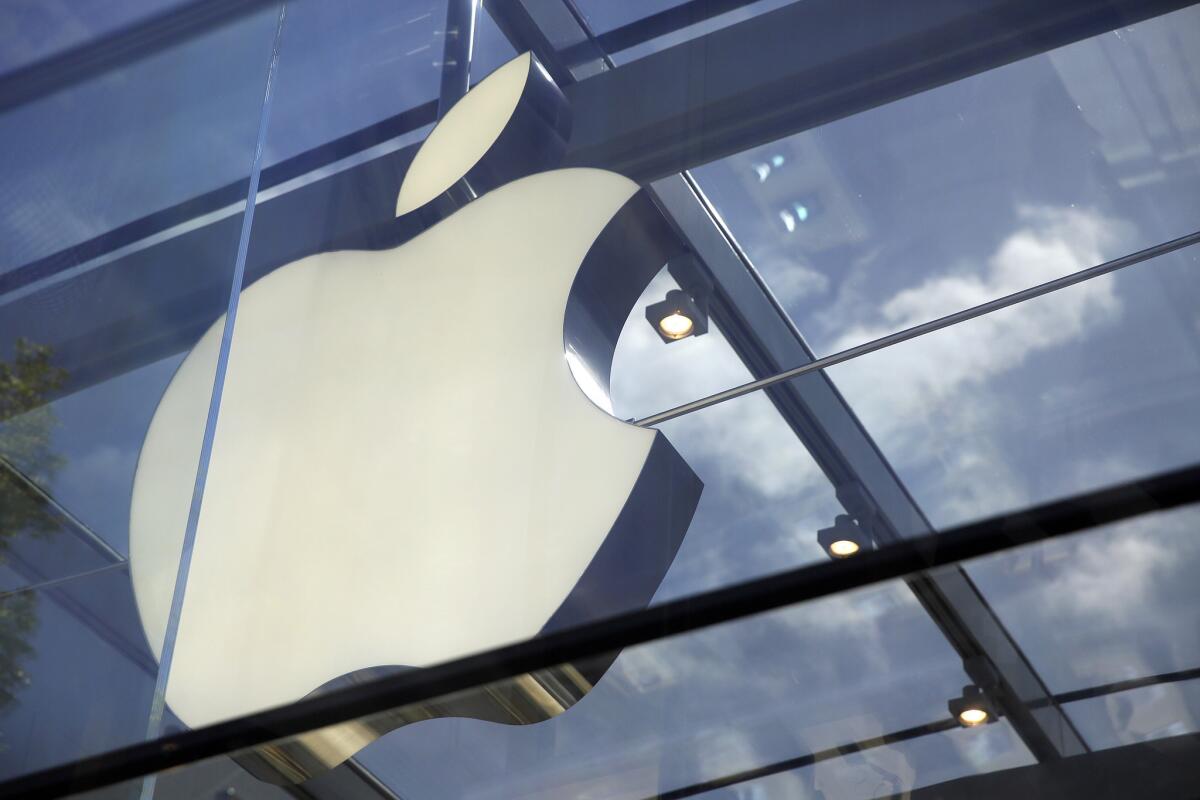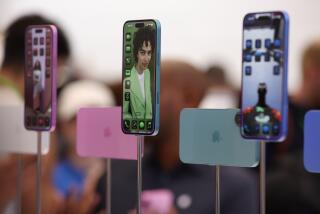Apple earnings jump, and CEO Tim Cook talks up augmented reality

- Share via
Apple Inc.’s earnings climbed 12% to $8.7 billion in the company’s latest quarter amid rising demand for iPhones, iPads and Mac computers.
Revenue for the period was $45.4 billion, up 7% from the same quarter last year.
The fiscal third-quarter results announced Tuesday exceeded analysts’ projections for the period, which ended July 1.
The Cupertino, Calif., company predicted that revenue for its current quarter, which ends in September, will range from $49 billion to $52 billion. That would be better than Apple’s performance a year earlier, when its popular line of iPhone 7 phones came out.
The upbeat forecast is likely to ease concerns that production problems might delay the release of Apple’s next-generation iPhone, which typically comes out in late September. That model is expected to boast a higher-quality screen and several other new features.
Apple shares have increased nearly 30% since the beginning of the year, while the Standard & Poor’s 500 index has climbed 11%. On Tuesday, before Apple announced its earnings, its stock rose $1.32, or 0.9%, to $150.05.
Apple has been looking for something to reduce its dependence on the iPhone since the 2011 death of its co-founder and chief cxecutive, Steve Jobs, the driving force behind the company’s innovation factory.
Jobs’ successor, Tim Cook, thought he had come up with a revolutionary product when Apple began selling its smartwatch in 2015, but the Apple Watch remains a niche product.
For now, the iPhone remains Apple’s dominant product, accounting for 55% of Apple’s $45.4 billion in revenue during the three months that ended in June.
Cook told analysts during a Tuesday conference call that the company is hoping to use the iPhone as a springboard into “augmented reality,” a technology that projects lifelike images into real-world settings viewed through a screen.
If you’ve heard about AR at all, it’s most likely because you’ve encountered “Pokemon Go,” in which players wander around neighborhoods trying to capture monsters only they can see on their phones.
AR is also making its way into education and some industrial applications, such as product assembly and warehouse inventory management. Now Apple is hoping to transform the technology from a geeky sideshow into a mass-market phenomenon.
It’s embedding AR-ready technology into its iPhones later this year, potentially setting the stage for a rush of new apps that blur the line between reality and digital representation in new and imaginative ways.
“This is one of those huge things that we’ll look back at and marvel on the start of it,” Cook said.
Many analysts agree. “This is the most important platform that Apple has created since the app store in 2008,” said Jan Dawson of Jackdaw Research.
There’s just one catch: No one can yet point to a killer app for AR, at least beyond the year-old (and fading) fad of “Pokemon Go.” Instead, analysts argue more generally that AR creates enormous potential for new games, home-remodeling apps that let you visualize new furnishings and decor in an existing room, education, healthcare and more.
For the moment, though, we’re basically stuck with demos created by developers, including a “Star Wars”-like droid rolling past a dog that doesn’t realize it’s there, a digital replica of Houston on a table and a virtual tour of Vincent Van Gogh’s bedroom.
At Apple, the introduction of AR gets underway in September with the release of iOS 11, the next version of the operating system that powers hundreds of millions of iPhones and iPads around the world. Tucked away in that release is an AR tool kit intended to help software developers create new AR apps.
Those apps, however, won’t work on just any Apple device — only the iPhone 6S and later models, including the hotly anticipated next-generation iPhone that Apple will release this fall. The 2017 iPad and iPad Pro will run AR apps as well.
Apple removes VPN services from App Store in China, making it harder to circumvent online censors »
UPDATES:
4:55 p.m.: This article has been updated with additional details from Apple’s earnings call with analysts.
This article was originally published at 2:10 p.m.






